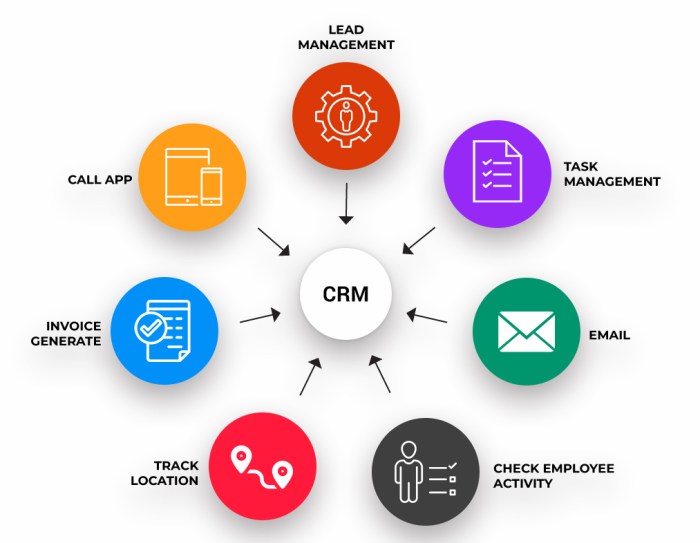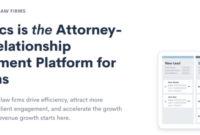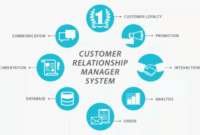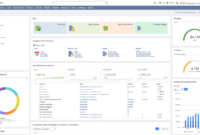Online CRM, a digital revolution in customer relationship management, has transformed how businesses interact with their customers. It goes beyond traditional methods, offering a centralized platform for managing customer interactions, automating tasks, and gaining valuable insights into customer behavior. This modern approach empowers businesses to personalize experiences, optimize sales processes, and foster long-lasting customer relationships.
From contact management and lead generation to sales automation and marketing campaigns, online CRM systems provide a comprehensive suite of tools to streamline operations and enhance customer engagement. These systems are designed to adapt to various business needs, offering features like customer support, reporting, analytics, and seamless integrations with other essential business applications.
Introduction to Online CRM
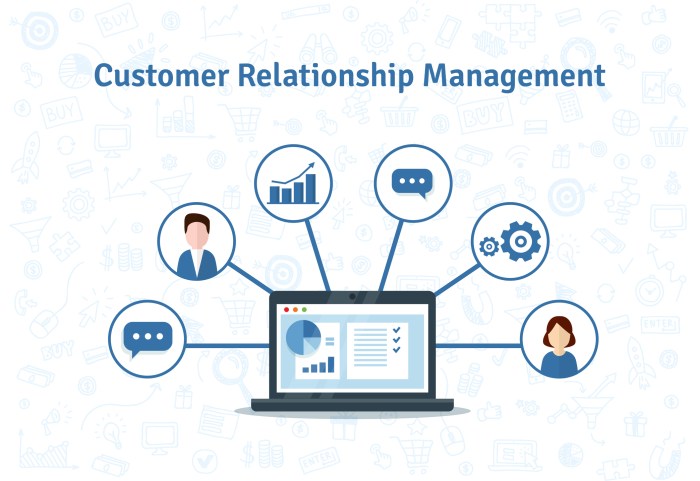
In today’s dynamic business landscape, understanding and engaging with customers is paramount to success. Online Customer Relationship Management (CRM) systems have emerged as a powerful tool for businesses of all sizes to manage customer interactions, optimize operations, and drive growth.
The Evolution of CRM
CRM has evolved significantly from its traditional roots. Initially, CRM was primarily a manual process involving paper-based systems and spreadsheets. This approach proved cumbersome and inefficient as businesses grew and customer data became increasingly complex.
The advent of technology ushered in a new era of CRM, with the introduction of software applications designed to automate and streamline customer management processes. These early CRM systems focused on automating tasks such as tracking customer interactions, managing sales pipelines, and generating reports.
However, they often lacked the flexibility and scalability needed to meet the evolving needs of modern businesses.
The emergence of the internet and cloud computing technologies revolutionized CRM once again, giving rise to online CRM platforms. These platforms offer a range of advantages over traditional systems, including accessibility, affordability, and scalability.
Benefits of Online CRM
Implementing an online CRM system offers numerous benefits for businesses, enabling them to enhance customer relationships, optimize operations, and drive growth.
- Centralized Customer Data:Online CRM systems provide a central repository for all customer data, including contact information, purchase history, interactions, and feedback. This centralized view allows businesses to gain a comprehensive understanding of their customers and tailor their interactions accordingly.
- Improved Customer Engagement:Online CRM platforms empower businesses to engage with customers across multiple channels, including email, social media, and chat. By providing personalized experiences and timely responses, businesses can build stronger customer relationships and foster loyalty.
- Enhanced Sales Efficiency:Online CRM systems streamline sales processes by automating tasks such as lead qualification, opportunity management, and pipeline tracking. This allows sales teams to focus on building relationships and closing deals, ultimately increasing sales productivity.
- Data-Driven Insights:Online CRM platforms collect and analyze vast amounts of customer data, providing businesses with valuable insights into customer behavior, preferences, and trends. This data-driven approach enables businesses to make informed decisions about marketing campaigns, product development, and customer service strategies.
- Increased Customer Satisfaction:By providing personalized experiences, responding to inquiries promptly, and addressing customer concerns effectively, online CRM systems contribute to increased customer satisfaction and loyalty. Satisfied customers are more likely to make repeat purchases, recommend the business to others, and become brand advocates.
Features of Online CRM Systems
Online CRM systems are packed with features designed to streamline business processes, boost sales, and improve customer relationships. These features cater to various aspects of customer interaction, from initial contact to ongoing engagement.
Features of Online CRM Systems
Online CRM systems offer a comprehensive suite of features to manage customer interactions and enhance business operations. These features can be broadly categorized as follows:
| Feature | Description | Examples |
|---|---|---|
| Contact Management | Centralized storage and organization of customer information, including contact details, communication history, and purchase records. |
|
| Lead Generation | Tools for attracting potential customers and capturing their information. |
|
| Sales Automation | Automating repetitive sales tasks to improve efficiency and productivity. |
|
| Marketing Automation | Automating marketing tasks to personalize customer communication and improve campaign effectiveness. |
|
| Customer Support | Tools for managing customer inquiries and providing timely support. |
|
| Reporting and Analytics | Dashboards and reports for tracking key performance indicators (KPIs) and analyzing customer data. |
|
| Integrations | Connecting with other business applications to streamline workflows and improve data sharing. |
|
Choosing the Right Online CRM
Selecting the perfect online CRM system is crucial for streamlining your business operations and enhancing customer relationships. With numerous options available, it’s essential to consider various factors to ensure a successful implementation.
Factors to Consider
Several factors influence the selection of an online CRM system. These factors can be broadly categorized as follows:
- Budget: Determining your budget is a crucial starting point. Online CRM systems offer a range of pricing models, including monthly subscriptions, per-user fees, and tiered pricing based on features. Consider your budget constraints and align them with the features and functionalities offered by different systems.
- Business Size: The size of your business plays a significant role in choosing an online CRM system. Smaller businesses may benefit from simpler and more affordable options, while larger enterprises may require more robust and scalable solutions.
- Industry: The specific industry you operate in can influence your CRM requirements. Different industries have unique needs and workflows, and specialized CRM systems cater to these specific demands.
- Specific Needs: Identify your specific needs and prioritize the functionalities you require. Consider aspects like contact management, sales automation, marketing automation, customer support, and reporting capabilities.
Evaluation Criteria, Online crm
Once you’ve identified your needs and budget, it’s time to evaluate different CRM options. Here’s a comprehensive list of criteria to guide your selection:
- Ease of Use: The CRM system should be user-friendly and intuitive for your team. A complex interface can hinder adoption and reduce productivity.
- Features and Functionality: Ensure the system offers the essential features you need for your business operations. Consider the core functionalities, such as contact management, sales automation, marketing automation, and customer support.
- Integration Capabilities: Check if the CRM integrates seamlessly with your existing business applications, such as email marketing platforms, accounting software, and social media tools.
- Mobile Accessibility: In today’s mobile-first world, a mobile-friendly CRM is essential. Ensure the system provides access to key functionalities and data from your mobile devices.
- Security and Privacy: Data security and privacy are paramount. Choose a CRM system with robust security measures and compliance with industry standards.
- Customer Support: Reliable customer support is crucial for resolving issues and ensuring a smooth user experience. Evaluate the availability and responsiveness of support channels, such as phone, email, and live chat.
- Scalability: As your business grows, your CRM system should be able to scale with your needs. Look for solutions that can accommodate increased data volume, user accounts, and functionalities.
Trial Periods and Free Plans
Trial periods and free plans offer valuable opportunities to test and evaluate online CRM systems before committing to a paid subscription. These options allow you to:
- Explore Features and Functionality: Experience the system’s features and functionalities firsthand. This hands-on approach helps you assess if the system aligns with your business needs.
- Evaluate Ease of Use: Test the system’s user interface and determine if it’s intuitive and easy for your team to navigate.
- Integrate with Existing Systems: Assess the integration capabilities with your existing business applications to ensure a seamless workflow.
- Gauge Customer Support: Experience the quality of customer support by submitting inquiries or seeking assistance during the trial period.
Implementation and Integration
Implementing an online CRM system requires a strategic approach to ensure a smooth transition and maximize its benefits. This involves carefully planning and executing the implementation process, considering factors like data migration, user training, and system customization. Furthermore, integrating your CRM with other business applications is crucial for streamlining workflows and enhancing data visibility.
Data Migration
Data migration is the process of transferring data from your existing systems to the new CRM. It’s a critical step in ensuring the accuracy and completeness of your CRM data.
- Identify data sources: Determine all the data sources that need to be migrated, including customer databases, sales records, marketing lists, and support tickets.
- Cleanse and standardize data: Ensure data quality by cleaning and standardizing data formats, removing duplicates, and correcting inconsistencies.
- Map data fields: Match data fields from your existing systems to the corresponding fields in the new CRM.
- Test data migration: Conduct thorough testing to verify the accuracy and completeness of migrated data.
User Training
Providing comprehensive user training is essential to ensure that your team effectively uses the CRM system.
- Develop training materials: Create user manuals, online tutorials, and interactive guides that explain the CRM’s functionalities and features.
- Conduct training sessions: Organize hands-on training sessions to guide users through the CRM’s features and demonstrate best practices.
- Provide ongoing support: Offer ongoing support through FAQs, knowledge bases, and dedicated help desks to address user queries and provide assistance.
System Customization
Customizing the CRM system to align with your specific business needs is essential for optimal functionality.
- Configure workflows: Customize workflows to automate tasks and streamline processes, such as lead qualification, opportunity management, and customer support.
- Develop custom reports: Create custom reports to track key metrics, analyze data trends, and gain insights into your business performance.
- Integrate third-party applications: Connect the CRM with other business applications to enhance functionality and data sharing.
Integration with Other Business Applications
Integrating your CRM with other business applications is essential for seamless data flow and improved operational efficiency.
- Marketing automation platforms: Integrating with marketing automation platforms allows you to automate marketing campaigns, track leads, and analyze campaign performance.
- E-commerce platforms: Integrating with e-commerce platforms enables you to track customer orders, manage inventory, and provide personalized customer service.
- Accounting software: Integration with accounting software streamlines financial processes, such as invoicing, payments, and reporting.
Successful CRM Implementation Strategies
Successful CRM implementation strategies involve a comprehensive approach that addresses key aspects of the process.
- Define clear goals and objectives: Establish clear goals and objectives for the CRM implementation to ensure alignment with your business needs.
- Involve key stakeholders: Engage key stakeholders from different departments to ensure buy-in and active participation in the implementation process.
- Phased implementation: Implement the CRM in phases to minimize disruption and ensure a smooth transition.
- Continuous improvement: Continuously evaluate and refine the CRM implementation to optimize its effectiveness and address evolving business needs.
Using Online CRM for Customer Relationship Management
An online CRM system is a powerful tool for managing customer interactions and building strong relationships. It helps businesses centralize customer data, streamline communication, and personalize experiences to foster loyalty and drive growth.
Leveraging Online CRM for Effective Customer Communication and Engagement
Effective communication and engagement are crucial for building strong customer relationships. Online CRM systems offer various tools to enhance these aspects:
- Unified Inbox:Consolidates all customer interactions, including emails, phone calls, live chat, and social media messages, in one central location. This allows for a holistic view of customer communication history and ensures consistent messaging across channels.
- Automated Communication:Streamlines communication by automating tasks such as sending welcome emails, appointment reminders, and follow-up messages. This saves time and ensures timely communication with customers.
- Personalized Communication:Uses customer data to personalize communication based on individual preferences, purchase history, and engagement levels. This creates a more relevant and engaging experience for customers.
- Targeted Campaigns:Enables businesses to create targeted marketing campaigns based on customer segmentation and behavior. This helps deliver the right message to the right audience at the right time.
Designing a Workflow for Managing Customer Interactions Across Different Channels
A well-defined workflow is essential for managing customer interactions across various channels effectively.
- Define Customer Journey:Map out the typical customer journey, from initial contact to purchase and beyond, identifying key touchpoints and interactions.
- Assign Responsibilities:Clearly define roles and responsibilities for managing different aspects of customer interactions, such as sales, marketing, support, and service.
- Establish Communication Protocols:Set clear guidelines for communication, including response times, tone of voice, and escalation procedures.
- Utilize Automation:Leverage automation tools to streamline repetitive tasks and ensure timely responses, freeing up time for more strategic interactions.
- Track and Analyze Performance:Regularly monitor key performance indicators (KPIs) such as response time, customer satisfaction, and conversion rates to identify areas for improvement.
Personalizing Customer Experiences with Online CRM
Personalization is key to building strong customer relationships and driving loyalty. Online CRM systems provide various tools for creating personalized experiences:
- Customer Segmentation:Group customers based on shared characteristics, such as demographics, purchase history, and behavior, to deliver tailored messages and offers.
- Personalized Recommendations:Use customer data to recommend products, services, or content based on individual preferences and past interactions.
- Dynamic Content:Adjust website content and email messages based on customer data, providing a more relevant and engaging experience.
- Personalized Communication Channels:Use customer preferences to communicate through their preferred channels, whether it’s email, SMS, or social media.
Measuring the Success of Online CRM
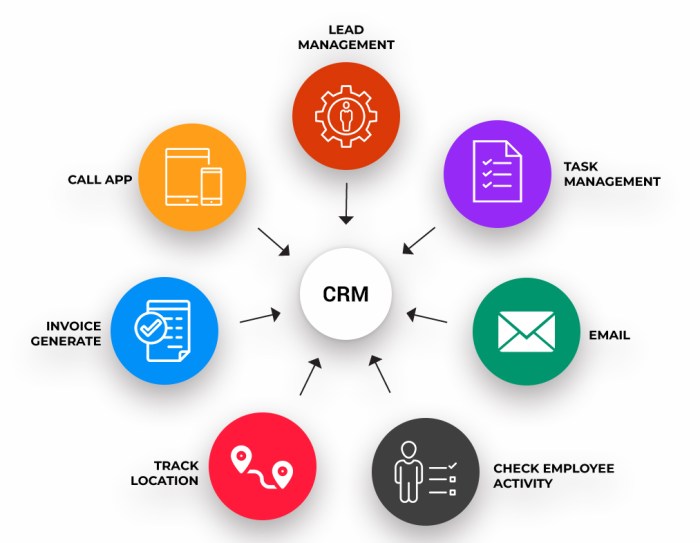
To truly understand the value of your online CRM system, you need to measure its effectiveness. By tracking key metrics and analyzing the data, you can gain insights into customer behavior, identify areas for improvement, and ultimately drive business growth.
Key Metrics for Tracking Online CRM Performance
Several key metrics can provide valuable insights into the performance of your online CRM system. These metrics can be categorized into four main areas: customer engagement, sales performance, marketing effectiveness, and operational efficiency.
-
- Customer Engagement Metrics:These metrics measure how engaged your customers are with your brand and your CRM system.
- Website Traffic:Track the number of visitors to your website, the pages they visit, and their time spent on your site. This data can help you understand which marketing campaigns are driving traffic and which areas of your website are most engaging.
- Email Open and Click-Through Rates:Analyze the open and click-through rates of your email marketing campaigns to gauge the effectiveness of your messaging and targeting.
- Social Media Engagement:Track the number of likes, shares, comments, and mentions your brand receives on social media platforms. This data can provide insights into your brand’s popularity and customer sentiment.
- Customer Feedback:Collect customer feedback through surveys, reviews, and social media monitoring to understand customer satisfaction and identify areas for improvement.
- Sales Performance Metrics:These metrics track the effectiveness of your sales team and the performance of your sales processes.
- Lead Conversion Rate:Track the percentage of leads that convert into paying customers. This metric helps you measure the effectiveness of your sales funnel and identify areas for improvement.
- Average Deal Size:Monitor the average value of your sales transactions to assess the profitability of your customer base.
- Sales Cycle Length:Track the time it takes to close a sale from the initial contact to the final purchase. This metric helps you identify bottlenecks in your sales process and optimize for faster conversion.
- Customer Lifetime Value (CLTV):Calculate the total revenue you expect to generate from each customer over their lifetime. This metric is crucial for understanding the long-term value of your customers and for making informed decisions about customer acquisition and retention.
- Marketing Effectiveness Metrics:These metrics measure the success of your marketing campaigns and your ability to reach and engage your target audience.
- Cost Per Acquisition (CPA):Track the average cost of acquiring a new customer. This metric helps you understand the effectiveness of your marketing spend and identify opportunities for optimization.
- Return on Investment (ROI):Calculate the return on investment for your marketing campaigns to measure their profitability and effectiveness.
- Marketing Qualified Leads (MQLs):Track the number of leads generated by your marketing campaigns that are qualified to be contacted by your sales team.
- Marketing Attribution:Analyze which marketing channels are driving the most leads and conversions. This data can help you optimize your marketing budget and focus your efforts on the most effective channels.
- Operational Efficiency Metrics:These metrics track the efficiency of your internal processes and your ability to deliver a seamless customer experience.
- First Response Time:Track the time it takes for your team to respond to customer inquiries. This metric is crucial for providing excellent customer service and building customer loyalty.
- Customer Support Ticket Resolution Time:Monitor the average time it takes to resolve customer support tickets. This metric helps you identify areas for improvement in your customer support processes.
- Data Entry Accuracy:Track the accuracy of data entered into your CRM system. This metric is crucial for ensuring the quality and reliability of your CRM data.
- CRM System Adoption Rate:Track the percentage of employees using your CRM system. This metric helps you understand the level of adoption and identify opportunities for improvement.
- Customer Engagement Metrics:These metrics measure how engaged your customers are with your brand and your CRM system.
Analyzing CRM Data to Gain Insights
Once you have collected data on key CRM metrics, you need to analyze it to gain valuable insights into customer behavior and business performance. There are several methods you can use to analyze CRM data, including:
-
-
- Data Visualization:Use charts, graphs, and dashboards to visualize your CRM data and identify trends and patterns. This can help you quickly understand key insights and make informed decisions.
- Segmentation:Segment your customer base based on demographics, behavior, and other criteria to understand the needs and preferences of different customer groups.
- A/B Testing:Run A/B tests on your marketing campaigns and sales processes to identify the most effective strategies for engaging customers and driving conversions.
- Predictive Analytics:Use predictive analytics to forecast future customer behavior and identify opportunities for growth. For example, you can use predictive analytics to identify customers who are at risk of churn or to identify potential upselling opportunities.
-
Using CRM Data to Improve Customer Satisfaction and Drive Revenue Growth
By analyzing CRM data, you can gain valuable insights that can help you improve customer satisfaction and drive revenue growth. Here are some examples:
-
-
- Personalize Customer Interactions:Use CRM data to personalize your interactions with customers based on their preferences, purchase history, and other factors. This can help you create a more engaging and relevant customer experience.
- Optimize Marketing Campaigns:Use CRM data to target your marketing campaigns to the right audience and deliver the right message at the right time. This can help you improve your marketing ROI and generate more leads.
- Improve Customer Service:Use CRM data to provide personalized customer service and resolve customer issues quickly and efficiently. This can help you build customer loyalty and improve your brand reputation.
- Identify Upselling and Cross-selling Opportunities:Use CRM data to identify opportunities to upsell or cross-sell products and services to existing customers. This can help you increase your average order value and drive revenue growth.
-
End of Discussion
Implementing an online CRM system is a strategic decision that can significantly impact a business’s success. By understanding the benefits, features, and implementation strategies, businesses can leverage the power of online CRM to build stronger customer relationships, drive revenue growth, and gain a competitive edge in today’s digital landscape.
As technology continues to evolve, online CRM solutions will undoubtedly play an even more crucial role in shaping the future of customer interactions.
Common Queries
What are some examples of popular online CRM platforms?
Some popular online CRM platforms include Salesforce, HubSpot, Zoho CRM, Pipedrive, and Microsoft Dynamics 365.
Is online CRM suitable for small businesses?
Yes, online CRM systems are designed to be scalable and can be customized to fit the needs of businesses of all sizes, including small businesses.
How much does online CRM typically cost?
The cost of online CRM varies depending on the platform, features, and number of users. Many platforms offer free plans or trial periods to allow businesses to explore their options before committing.
What are the benefits of integrating online CRM with other business applications?
Integrating online CRM with other business applications, such as email marketing, accounting software, and social media platforms, can streamline workflows, automate tasks, and provide a more unified view of customer data.

